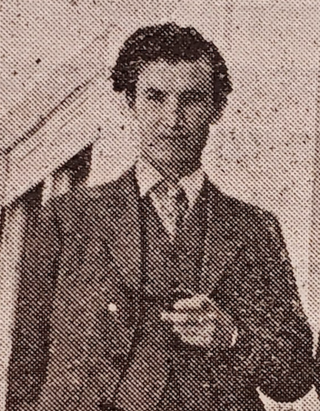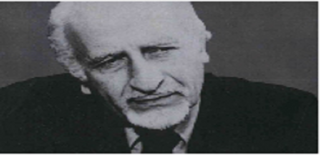
Khalil Ibrahim al-Wazir was a Palestinian leader and co-founder of the nationalist party Fatah. As a top aide of Palestine Liberation Organization (PLO) Chairman Yasser Arafat, al-Wazir had considerable influence in Fatah's military activities, eventually becoming the commander of Fatah's armed wing al-Assifa.

Efraim Karsh is an Israeli and British historian who is the founding director and emeritus professor of Middle East and Mediterranean Studies at King's College London. Since 2013, he has served as professor of political studies at Bar-Ilan University. He is also a principal research fellow and former director of the Middle East Forum, a Philadelphia-based think tank. He is a vocal critic of the New Historians, a group of Israeli scholars who have questioned the traditional Israeli narrative of the Arab–Israeli conflict.

The Damour massacre took place on 20 January 1976, during the 1975–1990 Lebanese Civil War. Damour, a Maronite Christian town on the main highway south of Beirut, was attacked by left-wing militants of the Palestine Liberation Organisation and as-Sa'iqa. Many of its people died in battle or in the massacre that followed, and the others were forced to flee. According to Robert Fisk, the town was the first to be subject to ethnic cleansing in the Lebanese Civil War. The massacre was in retaliation to the Karantina massacre by the Phalangists.

The government of Palestine is the government of the Palestinian Authority or State of Palestine. The Executive Committee of the Palestine Liberation Organization (EC) is the highest executive body of the Palestine Liberation Organization and acts as the government. Since June 2007, there have been two separate administrations in Palestine, one in the West Bank and the other in the Gaza Strip. The government on the West Bank was generally recognised as the Palestinian Authority Government. On the other hand, the government in the Gaza Strip claimed to be the legitimate government of the Palestinian Authority. Until June 2014, when the Palestinian Unity Government was formed, the government in the West Bank was the Fatah-dominated Palestinian government of 2013. In the Gaza Strip, the government was the Hamas government of 2012. Following two Fatah–Hamas Agreements in 2014, on 25 September 2014 Hamas agreed to let the PA Government resume control over the Gaza Strip and its border crossings with Egypt and Israel, but that agreement had broken down by June 2015, after President Abbas said the PA government was unable to operate in the Gaza Strip.

Walid Khalidi is a Palestinian historian who has written extensively on the Palestinian exodus. He is a co-founder of the Institute for Palestine Studies, established in Beirut in December 1963 as an independent research and publishing center focusing on the Palestine problem and the Arab–Israeli conflict, and was its general secretary until 2016.

Muhammad Nimr al-Hawari was a Nazareth-born Palestinian who studied law in Jerusalem, graduating in 1939. Al-Hawari served in the British Mandate administration as chief interpreter in the district court of Jaffa and chairman of the Association of Government second-division officers. He was transferred to Haifa where he resigned his government position in 1942. On his resignation, he returned to practicing law in Jaffa. Al-Hawari started his career as a devoted follower of Amin al-Husseini but broke with the influential Husseini family in the early 1940s. Muhammad Nimr Al-Hawari, during the termination of the British mandate, formed and commanded al-Najjada, a paramilitary armed movement. Al-Hawari was in command of the militia in the defence of Jaffa until he fled in the mass exodus of Palestinians in late December 1947. Al-Hawari fled from Jaffa to Ramallah in December 1947. Al-Hawari together with ‘Aziz Shihada a lawyer from Ramallah opened an office in the West Bank for refugee affairs. Hawari returned to Palestine and years later became judge in the District Court of Nazareth.
Shafiq al-Hout also spelled Shafik al-Hut was a Palestinian politician and writer. Born in Jaffa, he and his family fled to Beirut at the onset of the 1948 Arab-Israeli War. There, al-Hout became a journalist at Al Hawadeth magazine. Using it as a platform, he founded the Palestine Liberation Front in 1961 and later became a founder of the Palestine Liberation Organization (PLO) in 1964. He remained a senior member of the organization, representing it in Lebanon and the United Nations General Assembly. Initially a close aid to Yasser Arafat, al-Hout resigned from his position on the PLO Executive Committee, in protest of Arafat's signing of the Oslo Accords.
Force 14 is the aerial arm of the Fatah, the largest Palestinian faction within the Palestine Liberation Organization. Envisioned as the nucleus of a future Palestinian Air Force, Force 14 personnel included both fighter, helicopter and transport pilots. Nevertheless, its main role within the PLO has been political rather than military, and its activities centered on cargo and transportation. It is not known to have participated in any operations against Israel.
Anis Sayigh was an Arab Palestinian historian. He chaired the Palestine Research Center and was one of the main driving forces behind the Palestinian Encyclopedia. He was the target of an Israeli assassination attempt in 1972, receiving a letter bomb which resulted in a partial loss of his eyesight and loss of several fingers.
Rosemary Sayigh is a British-born journalist and scholar of Middle Eastern history. She is known for her works on the Palestinian people, particularly those forcibly displaced to Lebanon as a result of the Nakba.

The Revolutionary Palestinian Communist Party is a small Palestinian political party, founded in October 1982. Arabi Awwad was the general secretary of the party. As of the early 2000s, the party headquarters were in Damascus. The party calls for the establishment of an independent Palestinian state on "all national soil" through armed struggle.

The Arab Higher Committee or the Higher National Committee was the central political organ of Palestinian Arabs in Mandatory Palestine. It was established on 25 April 1936, on the initiative of Haj Amin al-Husayni, the Grand Mufti of Jerusalem, and comprised the leaders of Palestinian Arab clans and political parties under the mufti's chairmanship. The committee was outlawed by the British Mandatory administration in September 1937 after the assassination of a British official.
Al-`Asifah was the mainstream armed wing of the Palestinian political party and militant group Fatah. Al-Asifah was jointly led by Yasser Arafat and Khalil Wazir.

Abd al-Qadir al-Husayni was a Palestinian Arab nationalist and fighter who in late 1933 founded the secret militant group known as the Organization for Holy Struggle, which he and Hasan Salama commanded as the Army of the Holy War during the 1936–1939 Arab revolt and the 1948 war.

Mohammad Ibrahim Shtayyeh is a Palestinian politician, academic, and economist who served as Prime Minister of the State of Palestine and the Palestinian National Authority from 2019 to 2024. On 26 February 2024, he and his government announced their resignation, remaining in office in a demissionary capacity until a new government was formed on March 31, 2024.

Avi Shlaim is an Israeli and British historian of Iraqi Jewish descent. He is one of Israel's "New Historians", a group of Israeli scholars who put forward critical interpretations of the history of Zionism and Israel.
Fayez Sayigh (1922–1980) was an Arab-American diplomat, scholar and teacher. He was one of the most significant scholars who developed various analyses on the Palestinian resistance movement against Zionism.

Yusif Sayigh (1916–2004) was a Palestinian economist, academic and politician. He was an Arab nationalist and is known for his both academic and practical activities on economic development of Arabs.
Tawfiq Sayigh was a Palestinian academic, writer and journalist. He was the editor of the controversial Hiwar magazine.
Wajih Al Madani was a Palestinian major general who was the first commander-in-chief of the Palestine Liberation Army (PLA). He also served as the commander of the Kuwaiti security forces and director of the Kuwait Armed Forces.











